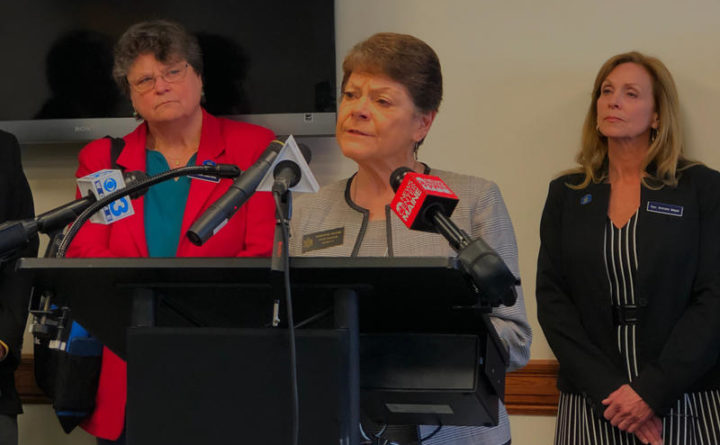
For the third time in four years, Maine lawmakers will consider a bill that would allow some terminally ill patients to request life-ending medication.
The initiative is described by supporters as “death with dignity” and by opponents as “assisted suicide,” and it has divided health care professionals and state lawmakers in the past. But if the new bill fails, Maine voters could be asked to decide the issue.
She said although he declined chemotherapy, the cancer went into remission. But after four years, it returned, sweeping through his body and putting him in hospice and on morphine.
By the end, Moore said she became convinced that, if given the chance, her father would have made the choice afforded to terminally ill patients in six other states: to end his life with medication.
Moore shared her story during a news conference Monday that is certain to bring forth dozens more on an issue so personal and polarizing that even its description can shape opinions.
Moore and other supporters call it “death with dignity.” Opponents call it physician-assisted suicide, a pejorative designed to reflect what they believe is an act that can be abused by insurance companies or doctors, or that is simply against their religious beliefs.
That was the position taken by Rep. Sheldon Hanington, R-Lincoln, two years ago when he testified against a similar proposal because it reminded him of his own father’s battle with the cancer that took his life.
“I’m a firm believer that life starts with conception and it ends with the last breath,” Hanington told the Health and Human Services Committee in 2017. “Do I want to be any part of that? No. Any of us that call ourselves Christian, we don’t want to do that.”
The 2017 hearing drew testimony from more than 100 people and organizations who offered views that cut across political parties. Even health care professionals were divided.
The American Nurses Association opposed the bill because it said that assisting in euthanasia is a direct violation of the nurses’ code of ethics.
The new measure would allow patients with less than six months to live the right to request life-ending medication. Democratic Rep. Michele Meyer, a registered nurse from Eliot, told reporters during Monday’s news conference that the bill is designed to give those patients a choice “to reject the notion that they must be passive victims to a frequently brutal disease that often strips them of their dignity and autonomy.”
The opposition isn’t always philosophical or based on religious beliefs. Two years ago, Disability Rights Maine openly worried that an aid-in-dying law could affect patients with disabilities because they’re not always informed of medical decisions made on their behalf.
Other opponents argued that it could be manipulated by insurance companies or those who exploit and abuse the elderly.
Hymanson said polling showed that three of four Maine voters supported the measure.
“As we’re representatives, we all need to take stock of that number,” she said. “That being said it’s a very private issue for a lot of people and I think all we can do is keep the discussion going.”
The Maine Death with Dignity group has already organized a ballot initiativethat could put the issue directly to voters, an avenue taken by half of the states that have already adopted such laws.
This article appears through a media partnership with Maine Public.
This article originally appeared on www.bangordailynews.com.







